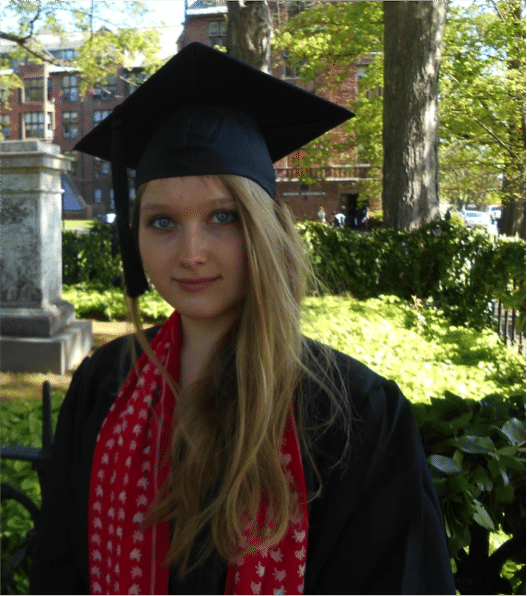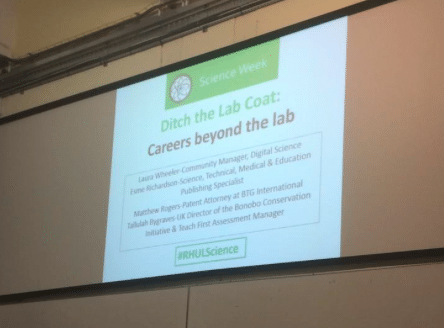Subscribe to our newsletter
Ditch the Lab Coat: Science Careers Outside of the Lab
 Naomi Rune is a 4th year Biomedical Sciences student at Royal Holloway, University of London. Her 3rd year of study in biological sciences took her to Mount Holyoke College where she was awarded with the International Certificate in Biological Sciences with Distinction. Her current final year project looks into the specific binding of heparin and heperan sulphate with cytokines.
Naomi Rune is a 4th year Biomedical Sciences student at Royal Holloway, University of London. Her 3rd year of study in biological sciences took her to Mount Holyoke College where she was awarded with the International Certificate in Biological Sciences with Distinction. Her current final year project looks into the specific binding of heparin and heperan sulphate with cytokines.
It’s a common misconception shared amongst many science students and graduates that they are destined only for a life in research. As a biomedical science student myself, I shared this feeling too until quite recently. Now, more and more science students are realising their potential to work outside of the lab and this is largely thanks to careers talks provided by accomplished science graduates to Universities across the country. Like the humorously named “Ditch the lab coat: Science Careers outside of the lab” held at Royal Holloway, University of London, last week. Here we were very fortunate to hear from a hugely inspiring and professional panel about their science careers that have taken them away from the lab bench.
First to talk was Laura Wheeler, Community Manager at Digital Science, a division of Macmillan Science & Education. Laura kicked off by recalling her time studying Biochemistry and her lab placements: it was very reassuring to hear her describe her lack of finesse in the lab; I have no doubts most students find lab work extremely challenging and could relate to her desire to branch out. Laura went on to tell her career story and how she preferred communicating science and how this led to her role at Digital Science. It seems that work experience is absolutely key for those students looking to broaden their horizons and gain vital skills beyond those acquired during their degree and PhD training. As Laura explained:
“Only 3.5% of UK science PhDs stay in university research.”
So we do need think about alternative careers and be aware that you can still train as a scientist, and use those skills to have an illustrious career outside of academia.
Next was Esme Richardson, a Scientific Recruitment Consultant at Inspired Selection and Treasurer of The Society of Young Publishers. Esme explained the wide range of roles available in Science Publishing: It’s not just writers and editors that are needed in this area but individuals with creative and digital skills that are in high demand too. Esme’s message here was that student’s should never feel afraid to approach companies to request work experience as it is often the case that these places are keen to train students with specific skills to suit a particular role.
Following Esme’s talk, Matthew Rodgers talked about his job as a patent attorney at BTG international. Matthew made it clear that to be an attorney was not an easy role and involved working very long hours. Furthermore, to reach a professional level this required some years in intense training. The salary as an attorney, however was certainly attractive! Matthew had one key message for us students to take away which was to
“never dismiss opportunities that are offered to you as you never know where they will lead you.”
This was certainly a principle by which Matthew lived throughout his career and it has served him very well in getting him where he is now.
Lastly, but certainly not least was TallulahBygraves, Director of her own Bonobo Conservation society and Ambassador for Teach First who inspired us all with her entrepreneurial skills. It was so wonderful to see how enthused she was about the work she does every day for both the conservation society and in her teaching career. This was a perfect example of how rewarding it can be to pursue your dreams and to work for something you feel very passionate about.
After the talk I took the opportunity to speak to the presenters in person to ask some questions I had about requesting work experience. I also learned about an opportunity to write a blog post for Digital Science which I thought was too good to be missed!
I came away from the talk with a new optimism for the future as I now know of the wide range of career options available to me. Not only this, but I now know of what steps I should take to get where I want to be. Science students really are hugely versatile and the skills that are gained in their degree set a good foundation upon which they can learn new skills to specialise into other career areas. The world is our oyster!




